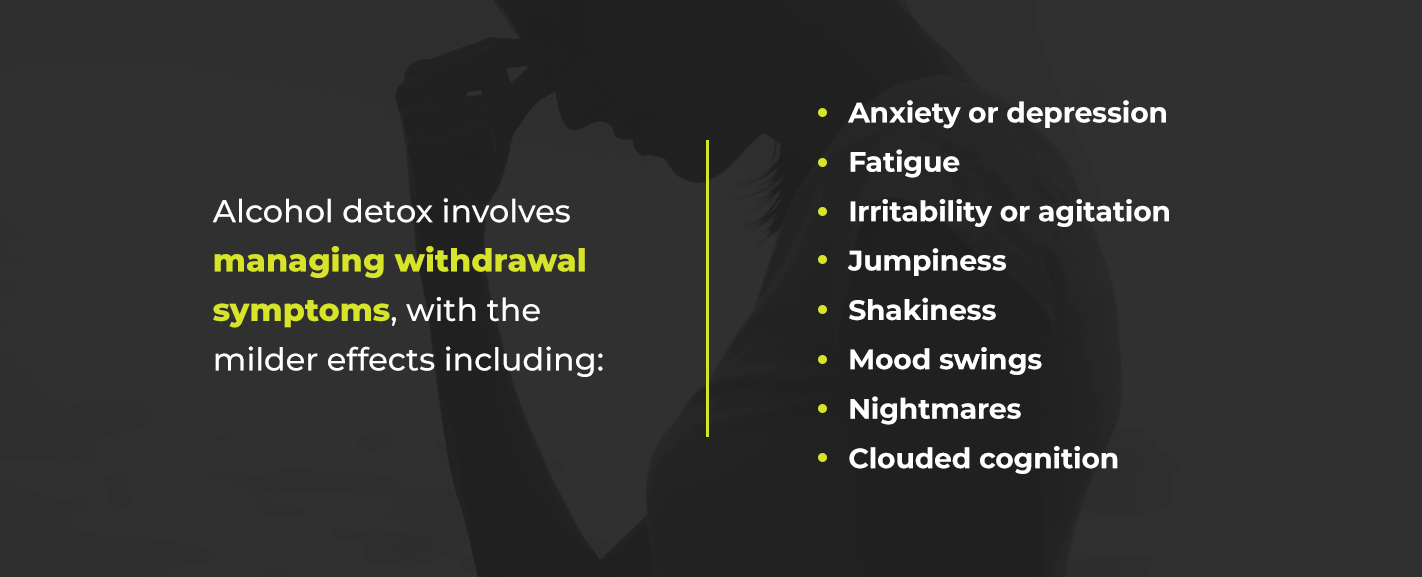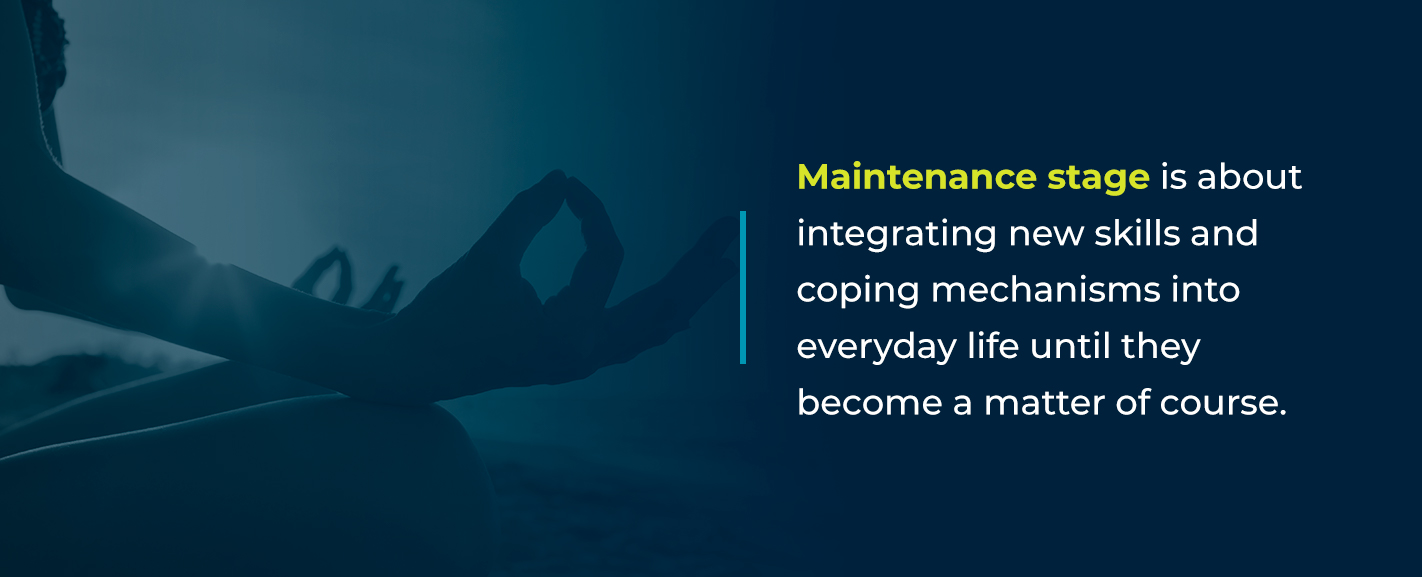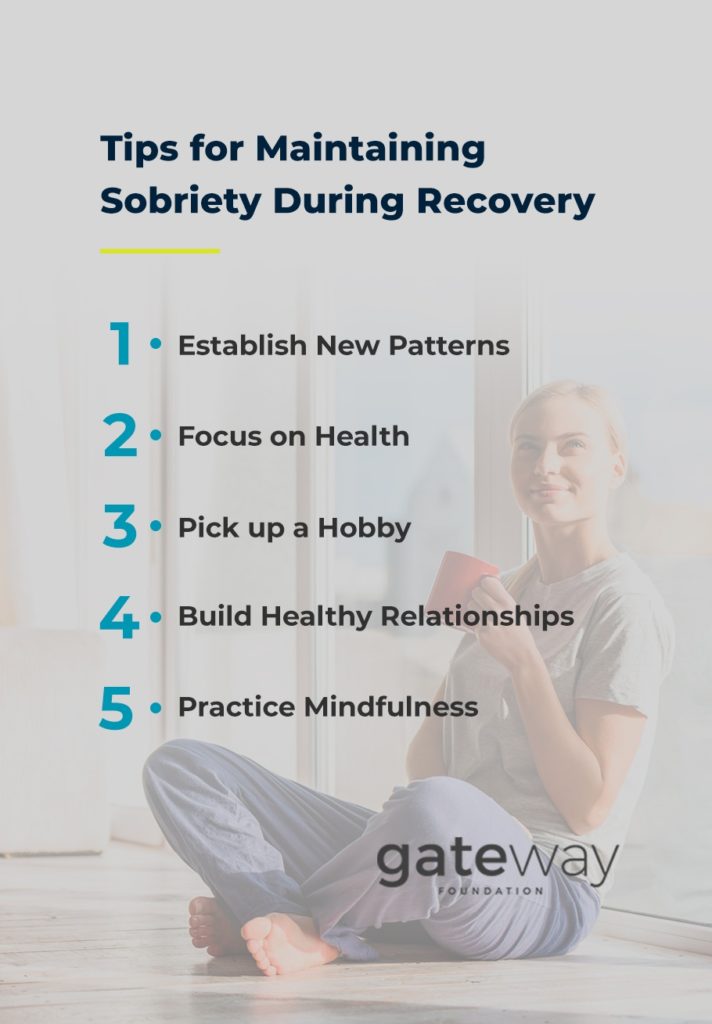- Oct 16
- Alcohol Addiction TreatmentDrug Detox
Alcoholism is one of the most dangerous addictions a person can have. Alcohol is the third leading preventable cause of death in America, yet few people get the help they need to address alcohol use and dependence. The good news is that most people can benefit from some form of treatment, but many people don’t even realize they have an issue until it becomes a fully-fledged addiction. Understanding the timeline and stages of alcoholism is one of the first steps to achieving recovery.
Signs You May Be Developing an Addiction to Alcohol
From big-budget TV ads to sitcoms and billboards, there is no shortage of sources telling us that drinking is fun and glamorous. While many people can have a drink or two with little to no ill effects, others have trouble knowing when to stop. Most people do not recognize when acceptable amounts of drinking slide into patterns that may indicate addiction. These are some of the signs your drinking is problematic:
- Missing work or school in the aftermath of drinking
- Deterioration in friendships and family relationships
- Financial trouble due to alcohol consumption
- Feeling guilty or depressed after drinking
- Drinking to alleviate social anxiety
- Drinking to feel more confident
- Drinking alone
- Drinking more than you intend to
- Drinking to the point of blackout and memory loss

One of the most glaring signs of burgeoning alcohol addiction is the development of tolerance. Tolerance is a state in which a person builds up a resistance to the effects of a substance, and therefore must consume increasingly higher amounts to produce the same results.
Tolerance tends to sneak up on people when they’re developing an alcohol addiction. When two beers don’t produce a good buzz anymore, a person may start drinking an entire six-pack in one sitting. It’s common for people with an alcohol use disorder to switch from beer to wine to hard liquor because it is a more cost-effective way to get drunk. If you find yourself continually needing to consume more alcohol to achieve the buzz you’re looking for, you should consider getting help.
 The Four Stages of Alcohol Use
The Four Stages of Alcohol Use
You have likely heard the idea that addiction is a disease. This concept comes from Elvin Morton Jellinek’s 1960 book “The Disease Concept of Alcoholism.” The book was the first to propose the disease model of addiction to alcohol that is now widely accepted as a means of definition. Under this model, alcoholism is a chronic condition that requires professional treatment, much like diabetes. The model also delineates four stages of alcohol use that progress over time.
1. Pre-Alcoholic Stage
Also known as the symptomatic drinking stage, this point in the development of addiction involves a person drinking as a means to cope with one or more problems in their life. One of the most seemingly innocuous ways this presents is in social drinking. When someone feels uncomfortable in a social situation, they may use alcohol as a way to “cut loose” or become more relaxed around a given group.
Social drinking to curb anxiety may seem harmless, and many people can do it without moving further through the stages of alcohol use. However, it indicates a mindset in which someone is viewing alcohol as the solution to a problem, and that attitude can be incredibly dangerous.
The development of a tolerance also defines the pre-alcoholic stage. There is no set length of time any person will remain in this or any other stage of alcoholism. Some people linger in the pre-alcoholic stage for years and build their tolerance very slowly, and others may develop a noticeable jump in their tolerance within just a few months of taking up symptomatic drinking. Unsurprisingly, pre-alcoholism is the easiest stage to treat.
2. Early Stage
The early stage of alcoholism is also called the “prodromal” stage. “Prodrome” is a medical term for a symptom that indicates the onset of a disease before other signs appear. The establishment of a pattern in alcohol abuse marks this transitional stage, which introduces cyclical abuse. The cycle begins when the individual’s drinking starts to cause problems in everyday life.
Relationships with family and friends begin to deteriorate as the person’s focus shifts more toward drinking. The person then deals with the stress of these alcohol-induced problems by drinking more. Alcohol has a remarkable ability to allow drinkers to forget or stop caring about their issues, which is why it’s so tempting to escalate when someone is feeling stressed.
The early stage is where blackouts start to occur. A blackout is when someone drinks so much their brain becomes incapable of forming memories, leading to hours of lost time. Blackouts are an especially potent source of guilt, which tends to prevent people from getting the help they need.
 3. Middle Stage
3. Middle Stage
The characteristics of the middle or “crucial” stage include extreme shame and profound guilt surrounding drinking. At this point, the person finally realizes they have a problem and may attempt to mitigate it by changing their patterns. However, the most common attempts to alter drinking patterns involve things like switching brands or trying to scale back from liquor to beer or wine.
The person struggling with alcoholism may try to generate periods of abstinence. In some cases, a person might succeed in not drinking for a few days at a time, or manage to lower their level of consumption. Unfortunately, the majority of individuals in this stage are unable to sustain these changes on their own and go back to a pattern of escalating alcohol misuse.
Failed attempts to rein in drinking deepen the shame spiral, and cause people to begin interacting with alcohol in ways anyone could recognize as unhealthy. They may attempt to rationalize their drinking and almost always begin hiding it from friends and family, leading to even greater damage to interpersonal relationships.
4. Late Stage
Late-stage alcoholism is also known as the “chronic” stage. According to Jellinek, up until this point, the individual has had agency over their choice to pick up the bottle or glass. Once a person reaches the chronic stage, they have little to no ability to limit their consumption. The individual is under a compulsion to drink, and will avoid any activities that stop them from doing so.
The late stage also links to the progression of alcohol-related diseases and damage. In time, the person will become visibly afflicted, even when they are not drunk. They may slur their words, have difficulty with coordination and experience cognitive declines.
The chronic stage of alcoholism sees a person’s life completely consumed with obtaining alcohol and drinking. If the person refuses to get treatment at this point, they have a very real risk of dying from alcohol abuse.
Stages of Addiction Recovery
Recovery from alcohol addiction is a decision that requires deep commitment. The model of change developed by psychologists James Prochaska and Carlo DiClemente breaks it down into six stages.
1. Pre-Contemplation
This initial stage of change occurs when the affected individual realizes the range of negative impacts drinking is having on their life. This realization may be something they actively avoid thinking about, as they have not developed any intention of taking action and finding treatment. The pre-contemplation stage is about growing awareness of the problem.
 2. Contemplation
2. Contemplation
A person in the contemplation stage wants to get help, but has not made a concrete decision to do so. They are likely on the fence and procrastinating. This stage involves the formation of vague plans that may or may not pan out, such as thoughts like “I’ll get help sometime in the next year.” This stage tends to hold onto people and keep them in a cycle of knowing change is necessary, but not feeling capable of acting on that knowledge.
3. Preparation
The preparation stage takes a person from “I should” to “I will.” Loose timelines tighten up, and the prospect of entering treatment becomes real. People in this stage benefit from opening up to friends and family about their decision to seek treatment, as it fosters accountability and helps with follow-through. People in the preparation stage are usually still drinking, but actively planning to stop with treatment. They should prepare a detailed plan of action to improve the chances of successfully entering treatment.
4. Action
After making a thorough plan in the preparation stage, the person is finally ready to take action and follow the steps they’ve outlined. For many people, this means first going through a medically assisted detoxification process at an alcohol addiction treatment center. After their system is free of alcohol and they have achieved physical stability, they will participate in the psychological side of treatment, including different types of therapy and counseling.
5. Maintenance
During the maintenance phase, a recovering alcoholic applies the tools they learned in treatment and enjoys the benefits of being sober. This stage is about integrating new skills and coping mechanisms into everyday life until they become a matter of course. The continuing actions necessary include finding ways to have fun without alcohol and avoiding triggers, for example.
 6. Termination
6. Termination
Addiction experts hotly debate this stage. In theory, it’s the point at which the person can confidently say they have conquered their addiction. They are fully sober, have no cravings for alcohol and do not have a significant risk of relapse.
The fact is that alcoholism is a chronic condition that requires lifelong management. While someone in the termination phase may be stable, vigilance against relapse is always necessary. Someone in the termination phase will still benefit from ongoing treatment, even if it’s not intensive. Visiting a therapist at least once a month, for example, will help keep a person stable in sobriety.
Alcohol Withdrawal Symptoms
Quitting alcohol is a challenging goal, and the physiological barriers to doing so make it even more difficult. When someone stops drinking alcohol after a prolonged period of frequent use, the brain goes into overdrive and responds with a series of symptoms collectively known as withdrawal.
Withdrawal is a deeply unpleasant and sometimes life-threatening condition that can stop recovery in its tracks if a person goes through it without medical supervision. Alcohol detox involves managing withdrawal symptoms, with the milder effects including:
- Anxiety or depression
- Fatigue
- Irritability or agitation
- Jumpiness
- Shakiness
- Mood swings
- Nightmares
- Clouded cognition

- Sweating and clammy skin
- Dilated pupils
- Headaches
- Insomnia
- Loss of appetite
- Nausea and vomiting
- Rapid heartbeat
- Tremors
In the worst of cases, alcohol detox can prevent the onset of the most severe type of withdrawal: delirium tremens. Delirium tremens, or DT, is incredibly dangerous because it strikes two to three days after the last drink of alcohol and, in some cases, takes up to seven days to set in.
DT is a life-threatening form of withdrawal that changes breathing, circulation and the body’s ability to control temperature. It can also cause dangerously elevated blood pressure and severe dehydration. It comes with confusion and disorientation, and can even cause loss of consciousness. Extreme sweating, disturbed sleep, irrational beliefs and hallucinations can occur. In severe cases, seizures may be a symptom of DT.
Alcohol withdrawal should only take place under medical supervision to ensure the most dangerous symptoms do not get out of hand. In some cases, a doctor can prescribe medications that ease the symptoms to make the process more comfortable. Detox or medication-assisted treatment are the best ways to get started on the road to recovery.
Tips for Maintaining Sobriety During Recovery
Sustained sobriety is the ultimate goal of any addiction treatment program. Achieving this takes hard work, and it’s not always clear how to do it. These five tips will help you or someone you care about stay sober during each of the stages of recovery.
1. Establish New Patterns
Recovery from alcoholism is all about codifying your new skills into habits. That can only happen if you identify and replace the old patterns that led to the addiction in the first place. Establishing new habits helps keep you away from triggers, which is an essential part of staying sober.
For example, if you used to come home from work, get yourself a drink and flop down on the couch, even the straightforward act of sitting down can trigger cravings based on muscle memory. You don’t have to drastically change your routine by standing up all night instead. Even a minor change like taking a shower as soon as you get home can help stop cravings. Establishing new patterns, both big and small, helps build a new life for a new you.
2. Focus on Health
Alcoholism ravages the body. The longer you drank uncontrollably, the more damage alcohol did to vital systems and organs. However, you can reverse some of the damage through a combination of healthy habits. For example, multiple studies have demonstrated an inverse relationship between aerobic exercise and substance abuse. With exercise, a nutritionally complete diet and enough sleep, you’ll feel far better than you did when you were drinking and want to keep it that way.
3. Pick up a Hobby
Alcohol addiction is incredibly time-consuming. All those hours you used to spend drinking and recovering from getting drunk are going to feel empty, and idle time makes cravings harder to ignore. Recovery is the perfect time to try out new hobbies and learn new skills. Many people find volunteering gives them a sense of drive and purpose, while also being an effective way to create a healthy pattern. Whatever you choose to do, don’t overlook the benefits of staying moderately busy.
4. Build Healthy Relationships
Alcoholism robs people of the most important relationships in their lives. While many people can repair relationships with those closest to them, others may not have that option. Regardless, it’s crucial to develop healthy relationships in recovery. These relationships provide support and motivation to continue staying sober. A healthy relationship is one where boundaries are clear and the friend in question respects your commitment to sobriety.
This aspect of recovery also involves some pruning of old friendships with people who enabled or encouraged your alcohol abuse. It’s not always easy to change the parameters of a relationship or cut it off altogether, but it may be necessary to allow healthy relationships to flourish.
5. Practice Mindfulness
People have practiced various forms of mindfulness for centuries, and research is beginning to affirm its potential for helping people achieve and maintain recovery from addiction. Experts believe activities like meditation may help restructure the brain’s reward system so natural rewards are once more appealing — a condition alcoholism takes away. Mindfulness is also a powerful tool in rejecting cravings. If you can identify a craving before it becomes overwhelming, you have a better ability to resist it.
Addiction Treatment: The Gateway to Recovery
Alcoholism is a condition that can rip your life away from you faster than you may realize. Choosing to seek treatment is the only way to safely and effectively begin your journey to recovery. At Gateway, we understand the toll addiction takes and the immense courage it takes to admit you have a problem. Our personalized addiction treatment programs apply evidence-based treatment with compassion for you and your specific needs.
Our wide variety of services ranges from outpatient to residential and everything in between, providing the appropriate level of medical supervision and support for alcohol addictions of any severity. Should you need medication-assisted treatment or withdrawal management, Gateway has you covered. Our addiction therapy services include treatment for those with a dual diagnosis of addiction and another mental illness. Multiple forms of proven therapy like motivational interviewing and cognitive behavioral therapy give you more options for creating a treatment plan that works for you.
Addiction is a disease, and you should treat it like one. Gateway is one of the few providers that effectively integrates the medical and psychological aspects of treatment for a whole-person approach. We have more than 50 years of treatment expertise, and have treated more than a million patients in that time. We know what works and strive to formulate the most effective plan for each individual.
If you are ready to stop alcohol from controlling your life, Gateway is here to help. We will guide you on your first steps to recovery, and the tools you learn will be with you for life. To learn more about our extensive addiction treatment options, we urge you to call us at 877-505-4673. You can also live chat with us in real time or use our contact form to get in touch. Find your way forward with Gateway.

 The Four Stages of Alcohol Use
The Four Stages of Alcohol Use 3. Middle Stage
3. Middle Stage 2. Contemplation
2. Contemplation 6. Termination
6. Termination

